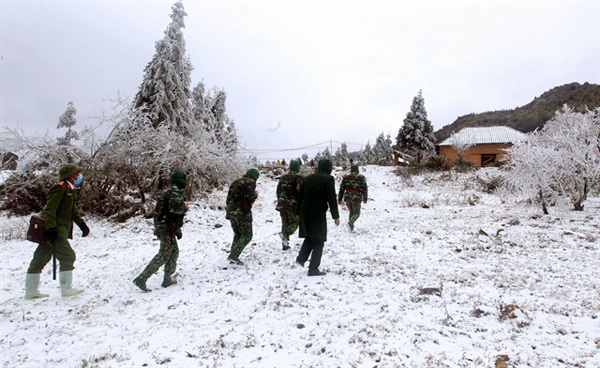 |
|
Border guards in the northern province of Lai Chau find a man illegally crossing border through path.
|
The checkpoint in the province’s Phong Tho District, 1,600 metres above sea level, which makes temperature in the area drop to between 5-7 degree Celsius, lower than the average temperature of Vietnam’s northern mountainous region.
It even dipped to below zero last weekend across many northern localities like Lai Chau, Son La, Lao Cai, Lang Son and Quang Ninh.
Most trees along the patrolled borderline were enveloped in a light layer of frost. Raindrops on branches crystallised into sharp shards hanging off of trees. The snow was falling thickly, covering houses, gardens and roads.
In a country with a tropical climate region like Vietnam, snowfall is a rare weather phenomenon which sees tourists flocking to snowing areas to satisfy their curiosity. But these adverse weather conditions adds hardship to border guards who usually work outside all the time in remote mountainous areas.
 |
| A fire helps border guards keep warm during their patrol in border mountainous areas. VNA/VNS Photo |
Major Ma A Phong of Si Lo Lau Border Guard Station said that despite the cold weather, border guards still went patrolling, as usual, two shifts in the morning and the afternoon.
“Dense fog limits our vision, which makes us more alert and heightens our concentration during the routine patrols,” he said.
“This is a busy time to tighten border control, prevent illegal entries and minimise the risk of the disease spreading into the community."
During the COVID-19 pandemic in Vietnam, border guards’ checkpoints are considered the first shield to protect the country from imported cases of coronavirus.
In addition to regular tasks, guards also visit villages of ethnic groups and instruct local people to keep warm, stay healthy as well as protect their cattle, poultry, and plants from the cold.
At another border guard station in Sin Suoi Ho Commune in the same district, guards learn from Dao ethnic people how to stay warm.
Colonel Lu Van Thuat of Sin Suoi Ho Border Guard Station said that they used clothing to wrap around their feet to keep warm as Dao people did.
“This tip is very useful as it helps avoid vasoconstriction when it is cold, improving blood circulation, especially when the soldiers have to walk for consecutive hours,” he said.
They also used hot salt compresses, put stones onto a fire or drink more ginger water, he said.
At the checkpoints, more tarpaulin is used to wrap up makeshift tents, he said, adding that they prepared hot food and water as well as regularly exercises to keep illnesses away.
“We have to stay healthy to fulfil our tasks,” he said.
Lieutenant Colonel Nguyen Xuan Hanh of Sin Suoi Ho Border Guard Station said that illegal border crossings were expected as Tet ( Lunar New Year) celebrations were coming, which made authorities work harder.
 |
|
Border guards in the northern province of Lao Cai go patrol after snow fell earlier this week.
|
In the northern province of Lao Cai, people saw 15cm-layers of snow in Y Ty Commune early this week.
Soldiers there also visited residents’ home to help fixing houses and make sure animals stay warm.
In the northern province of Son La, Lieutenant Lo Viet Hung of Chieng On Border Guard Station said that more sleeping pads, blankets and cotton hats were provided to soldiers working at COVID-19 checkpoints.
The soldiers also store more firewood, Hung said, adding that they would buy some husk-fired heaters for the checkpoints.
Soldiers are advised to keep exercising regularly to improve physical health and better adapt to the cold weather.
The strong cold spell also hit the north-central province of Thanh Hoa with night temperature dropping under five degree Celsius in Yen Khuong Commune, Lang Chanh District.
Young soldier Ngan Quang Thuan worked at the checkpoint based in the commune.
It was 10pm, Thuan and other soldiers were set for a night patrol after wearing warm clothes, facemasks and carrying guns. Rubbing his hands over a flickering fire to stay warm, Thuan told a reporter of Dân Trí online newspaper: “It’s cold but it doesn’t matter. As soldiers, we will overcome any difficulty.”
“When we are back, we will sit around the fire. We will be warm,” Thuan said, then leaving for his patrol. They are expected to come back to the station at 2am.
Colonel Ho Ngoc Thu of border guard station in Na Meo Border gate said that in some areas, border guards had to live and work in very harsh conditions, even without electricity, no clean water and no mobile phone connection.
“They have to patrol in geographic difficulties and harsh weather,” he said.
“At COVID-19 checkpoints, makeshift tents were built as many of us, in the beginning, though that the pandemic would soon go away.
“The pandemic has hit the country for almost a year. During the same period, border guards have kept up the COVID-19 fight. For times, the makeshift tents were blown away by strong winds.
“As the pandemic continued developing complicatedly, soldiers are all determined to work at the checkpoints and celebrate Tet there so other people can have a happy and safe holiday!” VNS

Border guards work tirelessly to prevent illegal immigration
As illegal entry and exit is a threat to the prevention and control of the COVID-19 pandemic, border soldiers across the country are making efforts to prevent illegal entrance, especially before the Tet (Lunar New Year) holiday.